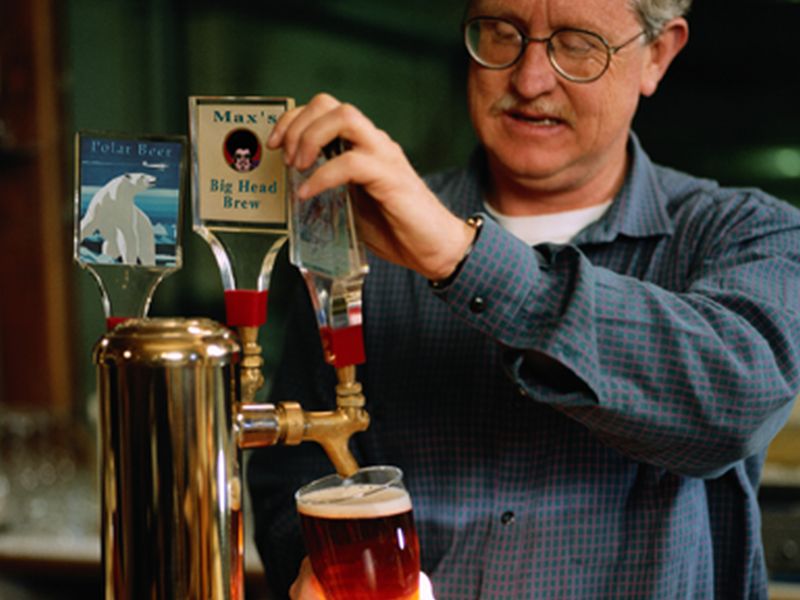

Oktoberfest Study Links Boozing to Heart Woes
Munich researchers find 1 in 3 beer drinkers tracked at festival experienced abnormal heart rhythmWednesday, April 26, 2017

WEDNESDAY, April 26, 2017 (HealthDay News) -- Drinking heavily over a short period of time can significantly boost the risk of an abnormal heart rhythm, even in healthy people, new German research suggests.
The finding stems from a study done at Munich's Oktoberfest, a long-standing Bavarian beer festival held every autumn. Over a 16-day period in 2015, researchers tracked the heart health and drinking patterns of a group of more than 3,000 men and women.
The investigators found that nearly a third of the group experienced an abnormal heart rhythm -- or "cardiac arrhythmia" -- at some point during the festival, a much higher percentage than usually seen among the general population.
What's more, investigators calculated that, for every additional gram of alcohol consumed per kilogram of blood (above zero), arrhythmia risk rose by 75 percent.
Study co-author Dr. Moritz Sinner, an assistant professor of medicine at University Hospital Munich, said that even though the phenomenon is well-known, the findings are "remarkable."
"For the first time we were able to demonstrate that alcohol has an immediate effect on the heart rhythm," he said.
He noted that this is the first study to track drinking and its impact on heart rhythms while participants were actually drinking, compared to other studies in which people try and recall their drinking behavior.
Sinner and his colleagues published their findings April 26 in the European Heart Journal.
Dr. Gregg Fonarow, director of the Ahmanson-UCLA Cardiomyopathy Center in Los Angeles, expressed little surprise at the findings.
"It is well-documented that alcohol consumption can increase the likelihood of having arrhythmias," he noted, adding that the phenomenon has actually given rise to a label -- "holiday heart syndrome."
According to the U.S. National Heart, Lung, and Blood Institute, a cardiac arrhythmia is essentially an electrical disruption to the normal workings of the heart, in which the heart muscle beats excessively fast, too slow or irregularly. In most cases it is harmless, but it can interrupt the usual flow of blood, raising the risk for serious organ, brain and heart damage.
In the Oktoberfest study, the participants were on average 35 years old, and 30 percent were women.
Their drinking patterns varied, from total abstention to 3 grams of alcohol per kilogram of blood, which was the maximum permitted by the researchers and far exceeds the German legal driving limit of 0.5 grams of alcohol per kilogram of blood.
The researchers estimated that a person would have to consume roughly 6 to 10 quarts -- or liters -- of beer to reach the 3-gram maximum.
Smartphone-enabled electrocardiogram readings were repeatedly taken, alongside breathalyzer readings. The results were tracked in comparison to a community-based chronic alcohol cohort study done in Augsburg, Germany.
In the end, the team found evidence of arrhythmias in almost 31 percent of the Oktoberfest participants, much higher than the 1 to 4 percent prevalence typically seen in the population at large. Just over a quarter of the arrhythmias involved excessive heart-beating ("sinus tachycardia").
The researchers concluded that alcohol consumption was a clear "trigger" for an increased risk of heartbeat irregularities.
Still, Sinner acknowledged that the study did not examine whether any participants had any undiagnosed heart condition that could have elevated the risk.
But, he added, the consequences for the Oktoberfest participants were "not immediately dramatic."
Fonarow agreed, noting that the heart irregularities observed in the study "were generally minor, transient and without lasting consequence."
As for practical advice, both Sinner and Fonarow admitted that it can be difficult to pinpoint the exact amount of alcohol that might trigger arrhythmia risk.
"The exact amount of alcohol consumption needed to produce arrhythmias likely varies among individuals," said Fonarow.
But, he added, "alcohol can have these effects even in individuals who do not regularly drink alcohol."
SOURCES: Moritz F. Sinner, M.D., MPH, assistant professor, medicine, University Hospital Munich, Germany; Gregg Fonarow, M.D., director, Ahmanson-UCLA Cardiomyopathy Center, Los Angeles; April 26, 2017, European Heart Journal
HealthDay
Copyright (c) 2017 HealthDay. All rights reserved.
News stories are written and provided by HealthDay and do not reflect federal policy, the views of MedlinePlus, the National Library of Medicine, the National Institutes of Health, or the U.S. Department of Health and Human Services.
- More Health News on
- Alcohol
- Arrhythmia








































No hay comentarios:
Publicar un comentario